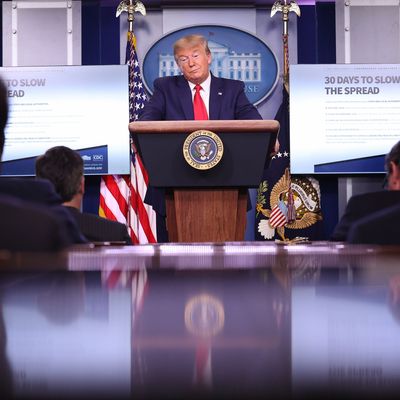
Is airing President Trump’s daily coronavirus ramblings — free of any filter — doing more harm than good? I spoke with political columnist Jonathan Chait and writer Eric Levitz about whether TV networks have a responsibility to shield viewers from the president.
Ben: Every afternoon at his daily coronavirus press conference/briefing/score-settling session, President Trump stands before a podium in the White House and spews misinformation, much of it potentially dangerous. (Public-health experts like Anthony Fauci often speak, too, as well as members of the Trump administration who usually preface their remarks with testimonials to their boss’s brilliance.) Though these strange events are scoring high ratings (much to the president’s delight) many have urged television networks to stop airing them, or at least air an edited portion that clears up some of the lies — about testing capacity, unproven treatments, and all the rest. (This is not unheard of — for instance, CNN didn’t air the entire briefing on Monday or Tuesday.) Some have also claimed that the press conferences have led to the current uptick in the president’s popularity.
Do you think it’s reasonable for networks to not cover what the president is saying in a time of national crisis, or is this more of a liberal fantasy that doesn’t comport with the way the news business does and/or should work?
Jon: Well, I think even the most extreme reform would have to cover Trump’s remarks in some form. The question is whether the coverage has to include live broadcasts in their entirety. It’s certainly true that the president saying things is generally newsworthy, though dull, rote comments are not. Trump’s habit of making outrageous claims means he does drive a lot of news. What needs to be worked out is a way to blend both the fact that he is doing newsworthy things with ways to cover that in real time in an informative, and non-misinformative, way.
Eric: The fact that many of the people calling for networks to stop airing these pressers also watch them in full on a daily basis does not make those calls hypocritical. One can believe both that news professionals should monitor the president’s statements and that news networks should not air them in full. But I think this overlap is indicative of the fact that there is a significant audience for these morbid spectacles. In this moment, the sense of the Trump presidency as a pitch-black comedy of errors — where a mad reality star somehow gets mistaken for the president and has to improvise his way through duties he’s completely unequipped to execute — is acute, and inspires a degree of fascination. So, I think some entity is going to air these things no matter what. As for whether mainstream networks should air them, I’d say no. They should probably air edited, fact-checked recaps.
Ben: Isn’t there a case to be made that viewers can figure out what they think for themselves? As aberrant a personality as Trump is, reserving this kind of treatment for him alone might set a dangerous precedent — or at least you can certainly see that argument being made with some weight behind it.
Jon: There’s definitely a case for that. It’s far from clear that broadcasting Trump live helps Trump at all. He has historically performed best when he’s out of the news.
Eric: Well, it’s also true that Trump’s routine public statements have been covered much more reliably than those of past presidents. But yeah, I do think some people are drawing a possibly mistaken inference from the correlation between the emergence of these daily pressers and a slight uptick in Trump’s approval. It is very hard to know — the ratings for these things really are extraordinarily high, so the president is in some sense getting hundreds of millions of dollars of “earned media.” It’s not crazy then to think that this is partially responsible for his approval hitting record highs in certain polls, and majorities approving of his coronavirus response in others. But then, it’s also the case that just about every national leader of a country impacted by the pandemic has seen an uptick in approval and that Trump’s bump is much smaller than the median “rally around the flag” bump that his peers have seen. So it’s also plausible that the pressers have had no effect, or are hurting him.
Jon: The best case for limiting or altering coverage is when Trump unveils some amazing new triumph that turns out not to exist. But that’s only happened a few times. Mostly it’s empty boasts of being fantastic and demands the media or Democrats be nicer to him. And of course blaming other people for everything that’s going wrong.
Ben: People already don’t trust the news media (thanks, it’s true, partly to Trump). So to set up special rules for this president in the midst of an unprecedented crisis does run the risk of further undermining that trust. I’m not saying they shouldn’t, say, fact-check or only air part of the briefings. But it’s not some obvious decision on their parts.
Jon: Agree. Finding a workable mechanism to blend truth-telling with the president’s inherent newsworthiness is really hard. Daniel Dale can fact-check Trump on Twitter in almost real time, but I don’t know how TV can do that.
Eric: I think there’s the distinct but related issue of how to handle Trump’s intermittent blackballing of reporters who ask good, pointed questions The whole spectacle is less troublesome when the show includes informed, sharp pushback from the reporters. So it’s important not to let Trump cut that from the production.
Ben: Indeed. What do you think is the best way to accomplish that?
Jon: The other day, I saw a reporter do something I haven’t seen in a while. The White House shut off Yamiche Alcindor’s microphone, and then a CNN correspondent who was given a question just yielded the floor to her. More of that would help.
Eric: Yeah, I think small acts of solidarity like that are probably the best way. The trouble with a more aggressive stance like boycotting pressers if he refuses to take questions from a certain reporter is that Trump would probably prefer if there were no mainstream reporters in that room.
Ben: Yeah, then we’d be down to the One America News Network people asking whether the term “Chinese food” is racist.





























